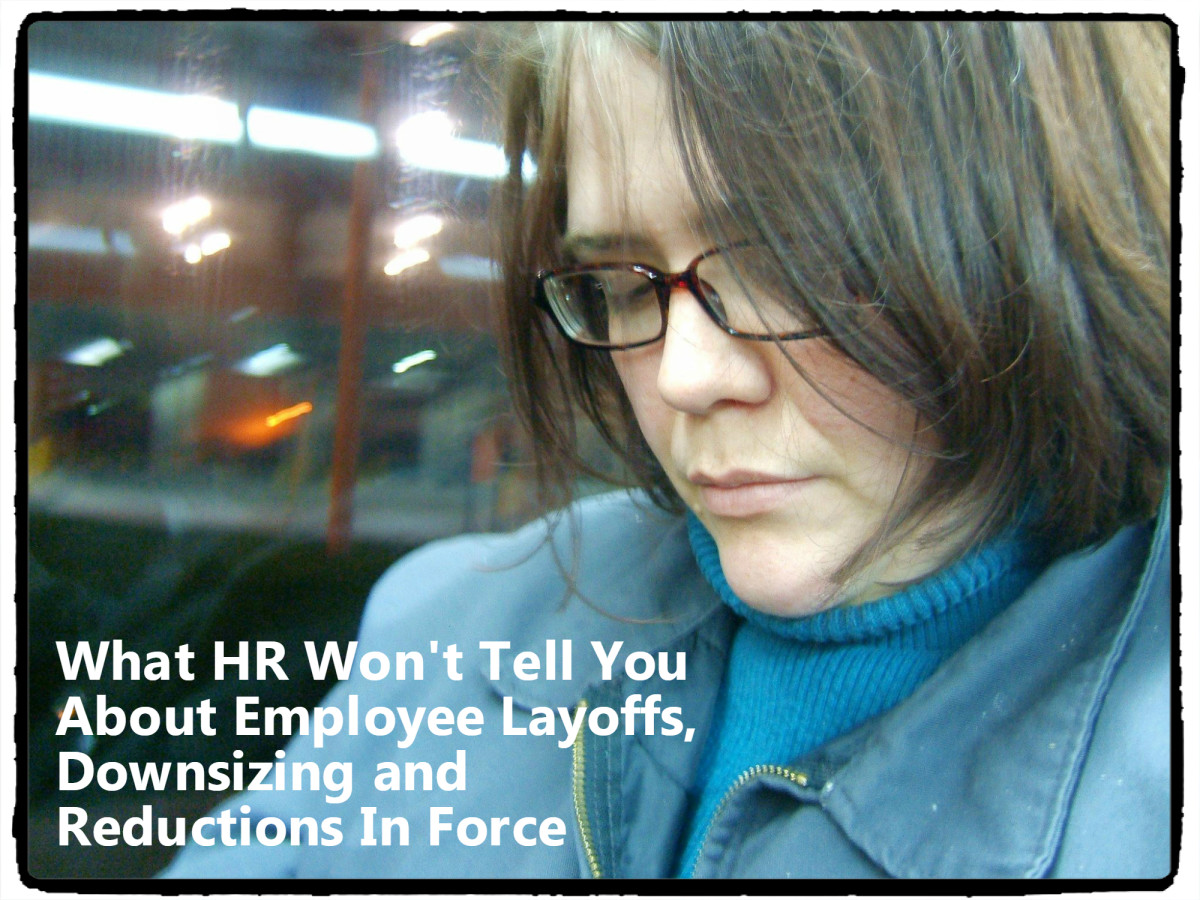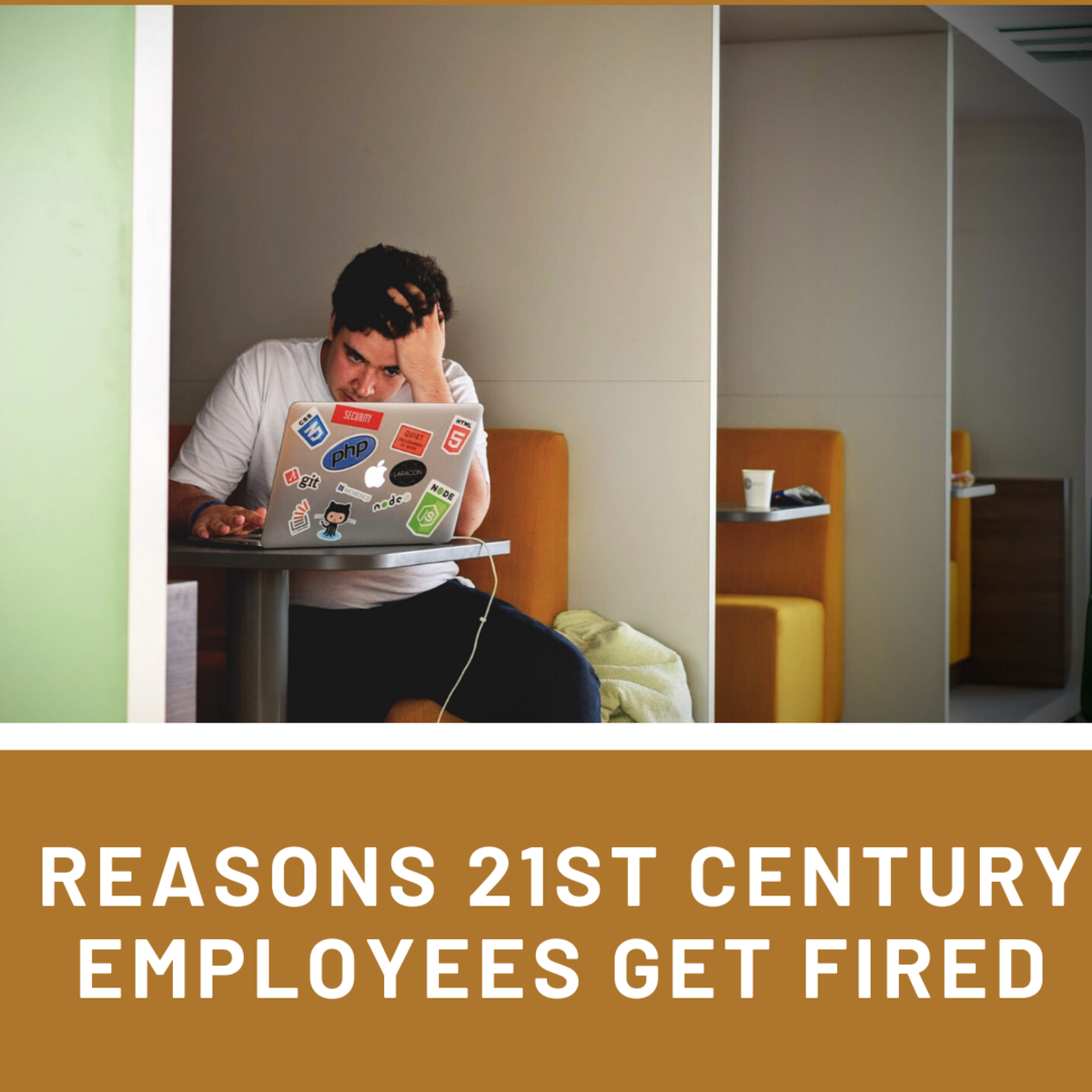The Worst Way to Lose Your Job

Have You Ever Lost a Job, or Known Someone Else Who Has?
When you lose your job it may feel like the end of the world, and it certainly does throw a big hitch (and a lot of stress) into it, but in the end, it really is a chance to make a positive change. I wanted to get people talking a little bit about their experiences and perhaps to even offer advice if they have any.
Please look around as I share my own experience and some of the horror stories I've heard. More importantly however, please participate in this discussion. I know what it's like to not have an outlet when something as traumatic a losing your job occurs. I will include some good references to help but please offer resources you've used as well, tell your story, or offer suggestions for the recently "let go" in the comments at the bottom of the page.

My Story
My education is as a therapist. After a few years of practice however, I found myself in the ranks of frontline supervisors and then just a couple of years later in mid-management. I've seen job loss from several angles. I've had co-workers lose their jobs, I lost my own once, and I was certainly involved in letting people go.
There's clearly no good way to lose your job, but there are certainly some that are handled better than others. There are many books on the subject so I won't go into that subject in much detail, but I can heartily agree that companies and managers should become well acquainted with the best, and most humane way to handle the situation.
I had personally dodged the bullet on at least two or three occasions in my career, but after ten or eleven years I had the opportunity to be "let go" due to downsizing. Like many people I suppose I always knew it was possible, and in my particular situation even felt it was the right thing to do based on our financial and operational realities within the facility where I worked. As a manager, I knew our current structure was nearly lethal, and I knew which positions should be slashed, and yes, mine was among them.
However, one morning when our group of managers arrived for our regular monthly operations meeting, I suspected nothing. When our Chief Operating Officier arrived, she started by announcing that some of us would no longer have our positions after that day. She then read the names of all department managers, including me, and said we had lost our jobs. She said that we might have an opportunity to apply for other jobs in the coming months but for now we were to continue to operate as usual and they would let us know. We were not to discuss this with anyone.
Although I was shocked, I was also a bit intrigued as to what the other jobs would be, when they would let us know more, and so forth. She had no information. This group of managers, who typically worked 50 to 60 hours per week, were to continue on despite the uncertainty.
Would we have a paycheck next month? Would we have another job? Would that job be cleaning toilets? We simply had no idea. But, and this is critical; we were NOT to discuss it.
There were other non-clinical management positions that were also eliminated, so that in the end there were probably 20-25 positions eliminated in total. In the coming weeks things got much worse. This was exacerbated by the lack of communication from the top administration about our status.
In the early days, some of the managers, honestly trying to be constructive wanted to meet as a group to begin planning for the structural changes that all of this would entail. They wanted to be involved in the work of figuring out how certain critical functions would be handled. They had designed this business themselves and grew it from the ground up. However, administration would have no part of it. In fact, if the affected managers were seen talking, they were labeled as trouble makers.
The managers who had been let go then became angry and in fact, I guess you could say "dangerous". I counted myself among the few who were dealing with it all pretty well because I actually felt some positive anticipation about the change. I don't see this as a positive attribute in my character, but rather an issue of good timing. I was probably getting a bit bored prior to the change.
Other managers began to leak information about big changes to the front-line employees; vague rumors, ugly rumors. In addition, they didn't perform their jobs and chaos was often the result. It also created a very negative and distracted work environment. This drug on for approximately 3 months and the damage was significant. In the end, I was the only one in my group who remained a year later and accepted a new position.

Just a Few Tips for Insensitive Employers
Ok, maybe I should have just said tips for employers who don't want to be insensitive, but it was my one chance to put it in writing....employers can be incredibly insensitive!
Some of the errors that I saw included:
- Public humiliation: If you are going to let people go, do it in person, one-on-one. Don't gang up on people and don't do it in front of others who will not be leaving.
- Incomplete information and poor communication: When an employee finds out they will be let go, they probably don't hear much of the information you provide at that time. However, vagueness is deadly and you should anticipate their questions and have as many concrete answers as possible. Potentially you could provide this in writing as well.
- Allowing employees to flounder. If the employee will not be leaving the building that day, be sure they have things to do. Give them a purpose, don't let them flounder. For remaining employees, be sure they are involved or at least well informed and quickly.
- Allowing no forum for discussion: If the affected employee will be around, give them an outlet for their thoughts and feelings. Even if all you can do is bring in employee assistance counseling, it's very beneficial. I often offered access to our EAP for 3 months even for employees who were being terminated for poor performance. I've also worked within organizations that set up assistance through career guidance/placement companies for those who were out of a job.

My Story Continued
After losing my job as a department manager, I interviewed and received a position managing more employees, coordinating several programs, and a huge number of miscellaneous duties that had typically fallen within the various "departments", which no longer existed. This was an open invitation to get every task under the sun.
In the end, I had the responsibility of totally reorganizing all of the tasks and responsibilities that department managers used to do; yes, those same things that the "affected managers" had wanted to structure earlier.
I became the go-to person, the only one who knew how things were supposed to operate, as well as the person to design and implement new processes in the face of change. I experienced what many downsizing survivors encounter: a crushing workload.
For a year or so it was fine. I was kind of energized. Then they downsized again. I received the duties of a few more managers and had few peers. By the third downsize in as many years, I was basically alone in the leadership of my section of the organization as even our COO was gone.
I had an impossible job (that about 12 people used to accomplish), was in charge of several departments that I understood nothing about, no clue as to how they operated, and had no one who could pass on information to me about it. I also had no peers with whom to relate, responsibility I never requested, and ex-co-workers who sometimes resented me for being allowed to stay. Even when they stayed in touch as friends, they often wanted to gossip about my place of employment and talk about how horrible it was.
I had no escape, guilt, and intolerable working conditions. I never once got a raise for the increased responsibilities, and only by fighting did I get the title changes I deserved. My employees and supervisors needed a lot of face time from me due to the uncertain environment and they were demanding I fix it all, now. Sympathy, obviously was not on the menu.
My requests for additional education to better perform my new responsibilities were rejected. I was both frustrated and ashamed at my failures over the course of the next several years, not something I was accustomed to experiencing. After five years however, I was finally able to take a different position, one which was, in my exhaustion, a better choice.
The change was good for me but also for the facility as they recognized the need for more positions, and placed three new managers in my previous area of responsibility. However, I believe the damage had been done; the cumulative effects of constant change were long lasting and a year and half later, at age 45 I decided to retire and find other employment that would allow me to have more control over my destiny.
Clearly, the victims of downsizing go beyond those who are dismissed.
So How Bad Was It?

Other Horror Stories
I know when I had my job loss experience I thought that it was handled as poorly as I could imagine. It was definitely bad, but perhaps I was wrong. From stories I've encountered, I would say there is no shortage of insensitive employers who really don't handle downsizing very well.
I had a brother-in-law who managed a store for a regional chain. As he and his wife (my sister) traveled a few hours away to an annual meeting, they were anticipating a nice time. The annual event involved work related meetings of course, but also some nice social events including a rather extravagant dinner. When they arrived there was a man waiting at the door. He greeted them, and many of the other managers as well, to let them know they no longer had jobs as they would be closing several of the stores.
Nice.
Kudos to my sister and her husband for deciding to stay and enjoy the dinner on the company.
In another instance, I had opened a position for a therapist, and hired a single mother of two who currently lived in Maryland (Several states away from where we were in Indianapolis). She was to start six weeks later. A few days before she was to begin, I was told there was a hiring freeze and we were to take no new employees. This woman had left her job, relocated her family to Indiana, and now had no pay check. This was about as insensitive as any thing I could imagine. I inquired about instituting a freeze on new offers but not on those that had already accepted a position. No go.
It's completely humiliating as a person to have to be the one to communicate such things and I did what little I could to talk to other facilities in the area to hook her up with any leads. As a manager, there is also frustration about these types of decisions, such cuts are often made without regard to the position. You may be short 3 or 4 physical therapists and have too many psychologists, but that doesn't matter, you can't hire anyone. Operationally, it makes no sense.

What It Comes Down to in the End
The reality is that companies and businesses sometimes have to downsize in order to survive. People lose their jobs despite the high quality of the work they have done. Everyone is harmed by this.
The people who are let go are often traumatized and without income, the people who are left feel guilt and they suffer the consequences of having even greater burdens placed upon them. Companies sometimes lose their reputation in the community if it's not handled well or they may lose in the areas of performance, quality, or perhaps their bottom line if not implemented correctly.
I don't want to be too sappy and say that anytime you lose a job, it's in your best interest. Losing a paycheck and living through days, weeks, or many months of struggle is proof that it's not as wonderful as some would have you believe.
On the other hand, it does sometimes force you to make hard decisions that you really do need to make but have put off. It also does honestly provide opportunity to learn, to grow, and in many instances to find a better form of employment. In any case, it IS something you can get through; persistence and learning can get you there.
Understanding the change process is important for everyone involved. For employees, learning to prepare and to adapt to change is critical, and for employers understanding how to implement and communicate change is even more important. There is a lot written on the subject. But I'm also interested in your general suggestions.
A Few Resources If You've Lost a Job
- Managing Job Loss and Financial Stress
Tips to get your finances in order and take your of your life. - Networking & Support Groups - My Perfect Resume
Tips and resources for your job search and networking opportunities - How to Cope with Job Loss - BI
Losing a job can lead to negative feelings (inadequacy, embarrassment, insecurity and devastation). Recovery can take time, making it easy to become depresse








